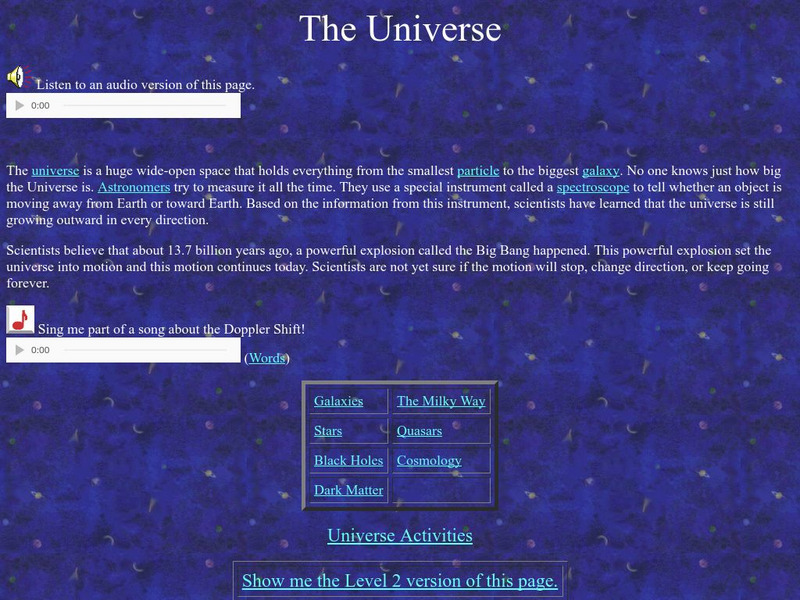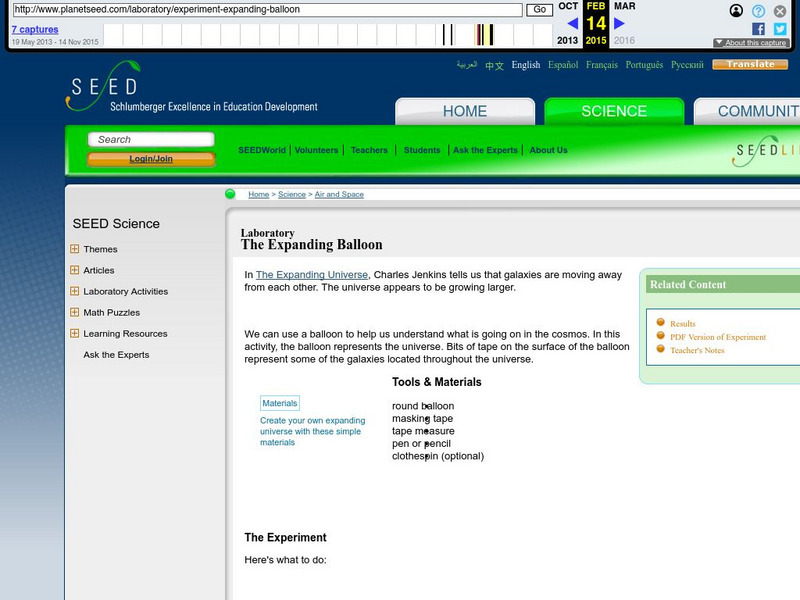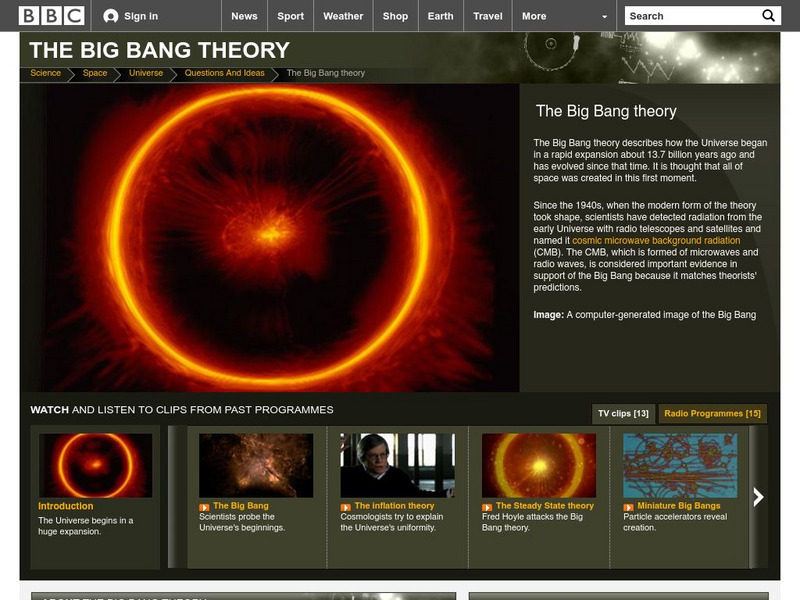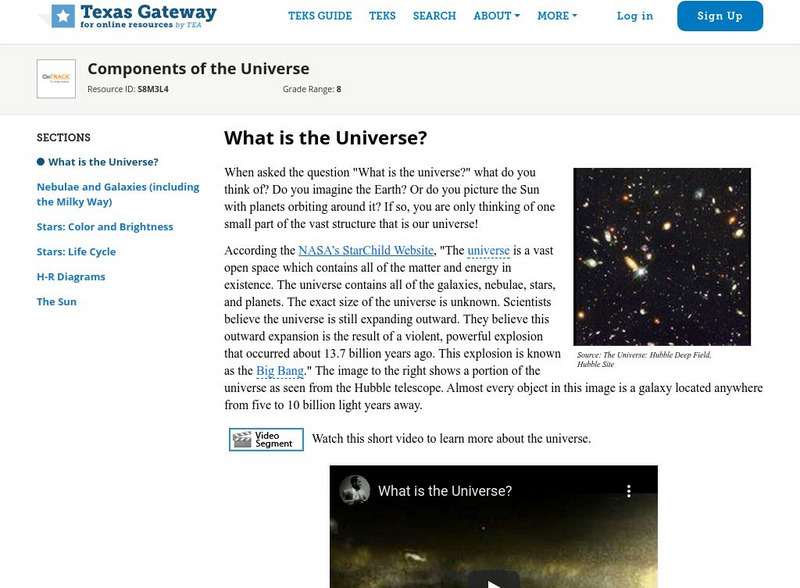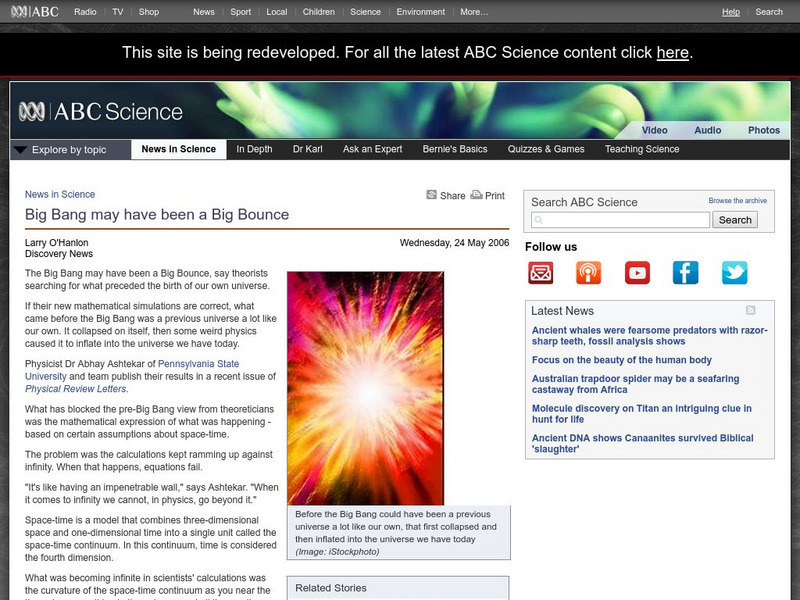Hi, what do you want to do?
CK-12 Foundation
Ck 12: Earth Science: Big Bang Study Guide
Review the science behind the Big Bang Theory of the origin of the universe.
Khan Academy
Khan Academy: Activity: Big Bang Snap Judgment
An activity for students to become familiar with the Big Bang Theory. Activity includes questions for students to process the big ideas of the Big Bang Theory.
NASA
Nasa: Space Place: What Is the Big Bang?
With exciting illustrations, NASA's Space Place explains the theory of the origin of the universe known as the Big Bang.
American Museum of Natural History
American Museum of Natural History: Big Bang Ology Card
Flip this interactive card to start learning about the Big Bang. Answer multiple-choice and fact-or-fiction questions and review some fast facts about this giant explosion that began the Universe billions of years ago.
Utah Education Network
Uen: Where Did the Matter in the Universe Come From?
Learners use various articles about how atoms are made and spread throughout the universe starting with the Big Bang. They will study the articles as groups and will then present their information to the class.
NASA
Nasa: Universe 101: Big Bang Theory: Big Bang Cosmology
Provides a brief explanation of the Big Bang Theory and the two theories on which it is based - the theory of general relativity and the cosmological principle. Links to a related page with more detailed information about the Big Bang...
NASA
Nasa Star Child: The Universe (Level 1)
This site provides an introduction to the origin of the universe for the young child and the Big Bang theory. There is also a song about the Doppler Shift. Vocabulary glossary and printable version available.
PBS
Pbs Learning Media: Wmap: "Baby Picture" of the Universe
View the Wilkinson Microwave Anisotropy Probe (WMAP) image from NASA to see the first detailed map of the oldest light in the universe, from 379,000 years after the Big Bang, over 13 billion years ago. A second image offers a visual...
PBS
Nova: History of the Universe
This interactive timeline provides information on the big bang as well as other major events of universe evolution. It also provides predictions about the universe's future.
Other
The Expanding Balloon Experiment
Great science experiment to help aide in the understanding of the Big Bang Theory. Students are able to complete this experiment with little materials and individually.
Mocomi & Anibrain Digital Technologies
Mocomi: The Big Bang Theory Facts
Learn how the universe came into existence by exploring the Big Bang Theory.
Other
American Institute of Physics: Ideas of Cosmology: Big Bang or Steady State?
Find out about the Steady State Theory of the origin of the universe. Learn about the scientific thinking and historical findings supporting this theory which states that new matter is continuously being created.
NASA
Nasa: Wmap: Fate of the Universe
A general look at the expansion of the universe and the Big Bang theory.
American Museum of Natural History
American Museum of Natural History: O Logy: How Did the Universe Begin?
Bite-size introduction to two scientists-Hubble and Lemaitre-who played key roles in formulating the theory of the origin of the universe known as the big bang. Includes an interactive timeline on which you can plot out the approximate...
TED Talks
Ted: Ted Ed: The Beginning of the Universe, for Beginners
How did the universe begin and how is it expanding? CERN physicist Tom Whyntie shows how cosmologists and particle physicists explore these questions by replicating the heat, energy, and activity of the first few seconds of our universe,...
BBC
Bbc: Origin of the Universe
Try this introduction to ideas about how the universe began and how it might end. Topics include; the big bang and its echoes, antimatter, and inflation/expansion of the universe.
TED Talks
Ted: Ted Ed: What Is the Universe Expanding Into?
Sajan Saini explains the existing theories around the Big Bang and what, if anything, lies beyond our universe.
Texas Education Agency
Texas Gateway: What Is the Universe?
The following tutorial is an explanation of what the universe is composed of.
Smithsonian Institution
Smithsonian Learning Lab: The Universe, an Introduction
Start with the questions all students ask: How big is the universe, how far away are the planets and stars, how did they form and when, how do they move and why? Build on their natural curiosity. The Smithsonian, in cooperation with...
Australian Museum
Australian Museum: The Earth: The Universe
Basic information about the universe, its origin and composition. Also includes information about galaxies, stars, and the sun.
Utah Education Network
Uen: Universe Devlopment What Is the Big Bang?
If you need a model of the big bang theory, then check out this resource. Using just a balloon and a marker, you can create a model of the big bang process.
ClassFlow
Class Flow: The Big Bang
[Free Registration/Login Required] Students often have a difficult time comprehending the timescale and distances of the universe. I have used this flipchart to start the discussion of the formation of our universe and how we know about...
Australian Broadcasting Corporation
Australian Broadcasting Corporation: News in Science: Big Bang May Have Been a Big Bounce
From ABC News in Science, Larry O'Hanlon's article suggests the possibility of the Big Bang having been created out of the remains of a previous universe which collapsed upon itself.











